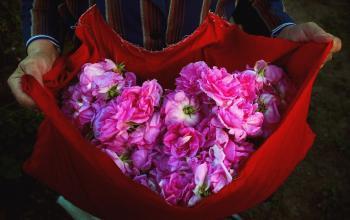Kala Jeera, which is also known as Kalonji, Nijella, or “black cumin” is a seed that for centuries has had many uses throughout the Middle East, India, and the Mediterranean. Interestingly there are actually two varieties of this seed that come from two completely different plants. The more common of the two is Nigella Sativa. Black cumin is also completely different in appearance and taste to “green” cumin, which is more common in the west.
The seed has a wide variety of culinary applications. It can be used in making powders and pastes for curry dishes. A tincture can be made from it by pouring boiling water over a small amount of seeds creating an aromatic tea. Or it can be added to your favorite tea or coffee. It can be mixed with flour to be baked into breads. Commonly, it is mixed with garlic and/or honey. It can be added to salad dressings or sprinkled over a soup or salad.
It is a very versatile seed that can be added to almost any dish to add aroma and nutritional value. It can be boiled, stewed, baked, stir-fried, etc. When adding Black Cumin to any cooked dish, the basic guideline to follow is to add it last, just moments before the dish would be served, because it has a very short cooking time.
Besides having many uses, Black Cumin has been regarding by many cultures throughout human history as having incredible healing properties. There are a wide variety of health applications from everything from common headaches, to asthma, to cancer, and AIDS. Of course black cumin is not a cure for these things, but it has shown in scientific research to have an incredible ability to boost the body’s natural defenses, as well as having anti-microbial properties. It is even used in health and beauty to strengthen the hair and nails.
Black cumin is not something that you will typically find in a grocery store in the US. You can find it in many Middle Eastern food stores that specialize in Indian, Pakistani, or Israeli, cuisine. Penzey’s Spices sells it as Kala Jeera. It may be found in many health food stores in pill or oil form. Or, there are dozens of online stores where you can obtain it in any form that suits your needs.
The seed has a wide variety of culinary applications. It can be used in making powders and pastes for curry dishes. A tincture can be made from it by pouring boiling water over a small amount of seeds creating an aromatic tea. Or it can be added to your favorite tea or coffee. It can be mixed with flour to be baked into breads. Commonly, it is mixed with garlic and/or honey. It can be added to salad dressings or sprinkled over a soup or salad.
It is a very versatile seed that can be added to almost any dish to add aroma and nutritional value. It can be boiled, stewed, baked, stir-fried, etc. When adding Black Cumin to any cooked dish, the basic guideline to follow is to add it last, just moments before the dish would be served, because it has a very short cooking time.
Besides having many uses, Black Cumin has been regarding by many cultures throughout human history as having incredible healing properties. There are a wide variety of health applications from everything from common headaches, to asthma, to cancer, and AIDS. Of course black cumin is not a cure for these things, but it has shown in scientific research to have an incredible ability to boost the body’s natural defenses, as well as having anti-microbial properties. It is even used in health and beauty to strengthen the hair and nails.
Black cumin is not something that you will typically find in a grocery store in the US. You can find it in many Middle Eastern food stores that specialize in Indian, Pakistani, or Israeli, cuisine. Penzey’s Spices sells it as Kala Jeera. It may be found in many health food stores in pill or oil form. Or, there are dozens of online stores where you can obtain it in any form that suits your needs.



